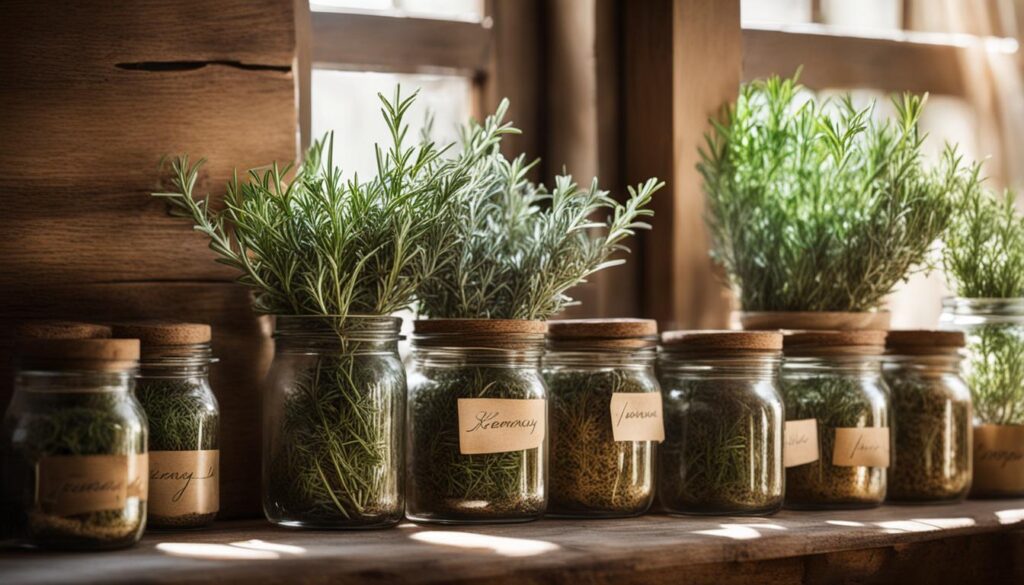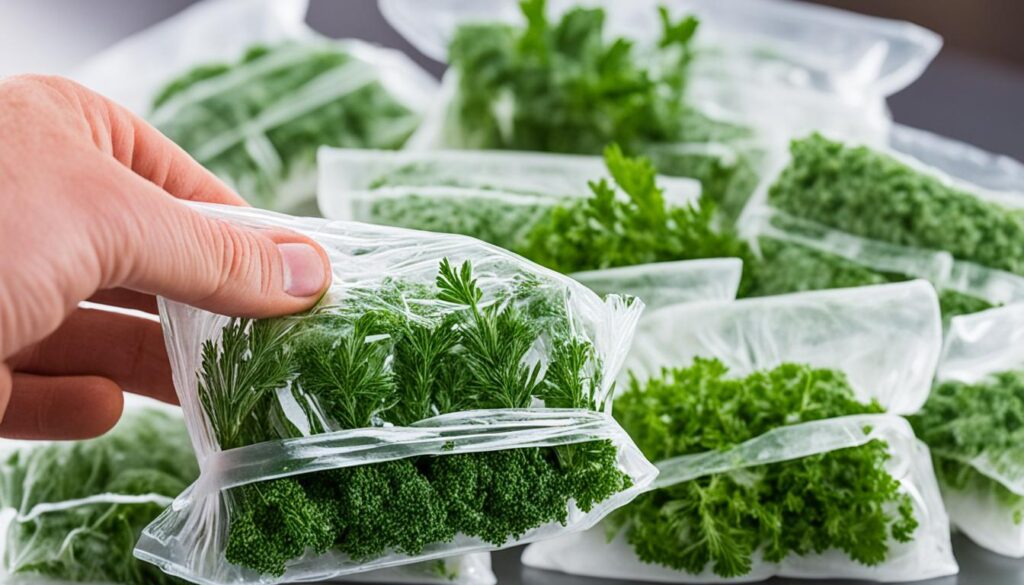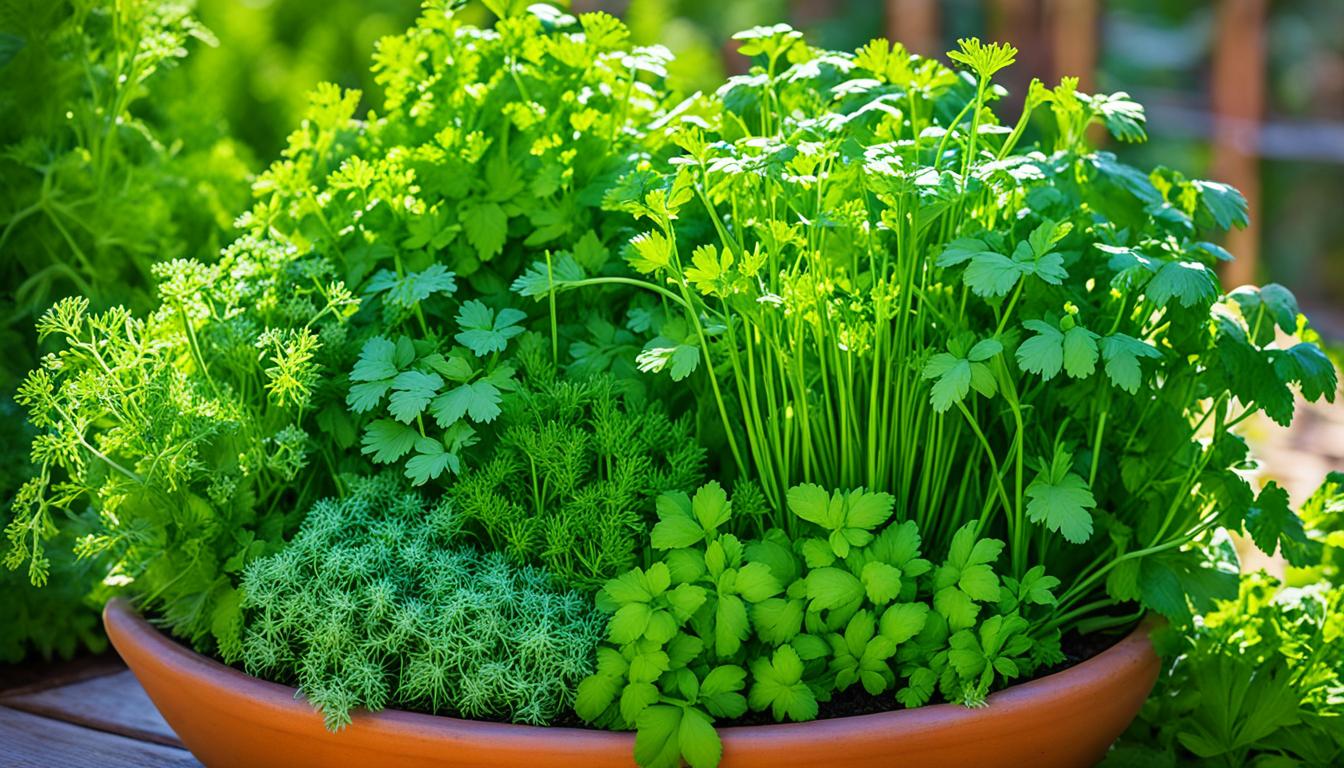Have you ever wondered what the best way to store fresh herbs like parsley, cilantro, dill, and basil is? Do you find yourself struggling to keep them fresh for longer periods? We’ve got you covered! In this article, we will reveal expert herb storage tips that will help you preserve the flavor and longevity of your favorite herbs. Say goodbye to wilted herbs and hello to vibrant, aromatic flavors that will elevate your culinary creations.
Key Takeaways:
- Storing fresh herbs properly is essential to maintain their flavor and longevity.
- Considerations like moisture, temperature, and exposure to light are crucial in herb storage.
- Soft herbs like parsley, cilantro, dill, mint, and basil require different storage methods compared to hardy herbs like rosemary, thyme, and oregano.
- Freezing herbs is an excellent long-term storage option.
- By following these expert tips, you can extend the shelf life of your herbs and reduce waste.
Storing Soft Herbs: Parsley, Cilantro, Dill, Mint, Basil
When it comes to storing soft herbs like parsley, cilantro, dill, mint, and basil, it’s crucial to handle them with care to maximize their freshness and flavor. By following a few simple steps, you can extend the shelf life of these delicate herbs and ensure they remain vibrant for longer periods. Here are our expert tips on how to keep herbs fresh and store them properly:
- Remove any rubber bands or fastenings: Before storing, remove any rubber bands or fastenings that may be holding the herbs together. This will allow the herbs to breathe and prevent any unnecessary bruising or damage.
- Wash and dry the herbs: Gently wash the herbs in cool water to remove any dirt or debris. Make sure to pat them dry thoroughly to eliminate excess moisture, as dampness can cause herbs to wilt quickly.
- Trim the stems: Using a sharp pair of kitchen shears or a knife, trim about an inch from the bottom of the herb stems. This will help the herbs absorb water more effectively and prevent them from wilting prematurely.
- Store in water: Place the herbs in a glass or jar filled with a few inches of water, similar to a bouquet of flowers. This method helps to keep the herbs hydrated and prolong their freshness.
- Cover the leaves: To create a mini-greenhouse effect, loosely cover the leaves of the herbs with a recycled plastic bag. This will help to retain moisture and prevent the herbs from drying out.
- Refrigerate and change water: Store the herbs in the refrigerator to maintain a cool temperature. Ensure to change the water every few days to prevent it from becoming stagnant and potentially causing the herbs to spoil.
It’s important to note that while soft herbs like parsley, cilantro, dill, and mint thrive in this storing method, basil requires special attention. Refrigerating basil can cause it to bruise and turn black. To keep basil fresh for up to two weeks, check out our quick hack below.
Quick Hack: Keeping Basil Fresh
If you want to maximize the shelf life of basil, follow this simple hack:
- Place basil stems in water: Fill a glass or jar with a few inches of water and place the basil stems in it, just like you would with other soft herbs.
- Cover with a plastic bag: Loosely cover the basil leaves with a plastic bag, creating a greenhouse effect. This will help to maintain humidity and keep the basil fresh.
- Store at room temperature: Unlike other soft herbs, basil should be stored at room temperature instead of in the refrigerator. Find a cool spot away from direct sunlight.
With these storage techniques, you can enjoy the vibrant flavors and aromas of soft herbs like parsley, cilantro, dill, mint, and basil for an extended period. Now, let’s move on to exploring the best practices for storing hardy herbs like rosemary, thyme, and oregano.
| Soft Herbs | Recommended Storage Method |
|---|---|
| Parsley | Store in water, covering the leaves |
| Cilantro | Store in water, covering the leaves |
| Dill | Store in water, covering the leaves |
| Mint | Store in water, covering the leaves |
| Basil | Follow the quick hack mentioned above |
Storing Hardy Herbs: Rosemary, Thyme, Oregano
Preserving fresh herbs is essential to ensure their long-lasting flavor and aroma. When it comes to hardy herbs like rosemary, thyme, and oregano, proper storage techniques can extend their shelf life and maintain their quality. Here’s how to store these robust herbs at home and enjoy their vibrant flavors for an extended period.
Step 1: Cleaning and Drying
Start by washing the herbs thoroughly under cool water to remove any dirt or impurities. Gently pat them dry using a paper towel or a salad spinner. It’s crucial to ensure that the herbs are completely dry to prevent moisture buildup, which can lead to decay.
Step 2: Trimming and Wrapping
Trim about an inch from the stems of the herbs to remove any wilted or damaged parts. Next, take a damp paper towel and wrap or roll the herbs in it. This provides a moist environment that helps to keep the herbs fresh while preventing them from drying out.
Step 3: Storing in a Ziplock Bag
Place the wrapped herbs in a ziplock bag and seal it securely, squeezing out as much air as possible. The airtight bag will protect the herbs from exposure to air and moisture, which can accelerate their deterioration. Make sure to label the bag with the herb’s name and the date of storage.
| Herb | Storage Temperature | Shelf Life |
|---|---|---|
| Rosemary | Refrigerator (32°F/0°C to 40°F/4°C) | 1 to 2 weeks |
| Thyme | Refrigerator (32°F/0°C to 40°F/4°C) | 1 to 2 weeks |
| Oregano | Refrigerator (32°F/0°C to 40°F/4°C) | 1 to 2 weeks |
Step 4: Checking for Freshness
To ensure the herbs stay fresh, periodically check for signs of spoilage. Discard any herbs with darkened or wilted leaves, strong odor, or mold growth on the stems. Fresh hardy herbs should retain their vibrant color, crispness, and aromatic scent.

Properly storing hardy herbs like rosemary, thyme, and oregano can significantly extend their shelf life and preserve their desirable flavors and aromas. By following these simple steps, you can enjoy the freshness of these herbs for up to two weeks or even longer.
Freezing Herbs for Long-Term Storage
If you have an abundance of fresh herbs, freezing them is a great way to preserve their flavor. Freezing herbs allows you to store them for later use, ensuring you can enjoy the taste of summer gardens even in the winter. Here are some herb storage tips for freezing your favorite herbs:
Freezing Hardy Herbs: Rosemary, Thyme, Oregano
For hardy herbs like rosemary, thyme, and oregano, follow these steps:
- Wash and dry the herbs thoroughly.
- Trim any excess stem and leaves.
- Place the herbs in a ziplock bag, squeezing out all the air to prevent freezer burn.
Freezing Soft Herbs: Parsley, Cilantro, Dill, Mint, Basil
Soft herbs like parsley, cilantro, dill, mint, and basil can be frozen with these methods:
- Wash and dry the herbs.
- Chop them up and place them in an ice cube tray.
- Add olive oil or water to the tray to cover the herbs.
- Once frozen, transfer the herb cubes to a freezer-safe bag.
Preserving Basil for Freezing
Basil has a different freezing process to prevent discoloration:
- Blanch the basil leaves in boiling water for a few seconds.
- Immediately transfer the leaves to an ice bath to stop the cooking process.
- Pat dry the basil leaves with a paper towel.
- Place the leaves in a freezer-safe bag or container.
Remember to label your frozen herbs with the date to keep track of their freshness. Properly frozen herbs can last for several months, giving you the opportunity to use them in your favorite recipes whenever you desire.

With these herb storage tips and freezing methods, you can conveniently store herbs for later use, ensuring their flavors remain intact. Whether it’s hardy herbs like rosemary and thyme or soft herbs like parsley and basil, freezing allows you to prolong the shelf life of your herbs and enjoy their fresh taste whenever you need them.
Conclusion
Properly storing fresh herbs like parsley, cilantro, dill, and basil is crucial to maintain their freshness and flavor. By following the herb storage tips outlined in this article, you can maximize the shelf life of your herbs and reduce waste.
Whether it’s storing soft herbs in water to keep them fresh and hydrated, wrapping hardy herbs in a damp paper towel to maintain their moisture, or freezing herbs for long-term use, each method has its benefits. Experiment with these techniques to find the best way to store your favorite herbs and enjoy their vibrant flavors for longer periods.
Remember, moisture, temperature, and exposure to light play important roles in herb storage. By providing the right conditions, your herbs can stay vibrant and flavorful for up to two weeks or even longer. Take care of your herbs and add that fresh touch to your culinary creations whenever you need it.
